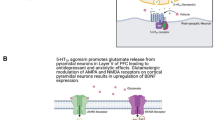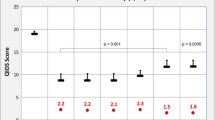Abstract
Serotonin reuptake inhibitors, such as dexfenfluramine, fluoxetine and fluvoxamine, have been proposed as therapeutical tools for the treatment of eating disorders and obesity. Sertraline, a SSRI used in the treatment of depression, interferes with eating behavior in animal models, but it has not been tested in obese humans. Aim of this study is the assessment of the effects of sertraline on eating attitudes and body weight in obese patients with and without mood disorders. A consecutive series of 65 obese out-patients aged 18–65 years, with a body mass index (BMI) >30 kg/m2, was treated for 6 months with sertraline 150 mg/day per os, in addition to a cognitive-behavioral treatment (CBT). A consecutive series of 60 obese patients with similar characteristics, who were treated with CBT only, were used as control group. A greater reduction of BMI (mean±SD) was observed in sertraline-treated patients when compared to controls (from 35.3±5.7 to 32.0±5.4 kg/m2 in sertraline-treated patients, from 37.1 ±7.0 to 36.0±7.1 kg/m2 in controls; 6.5±5.4% vs. 3.0±6.3%; p<0.01), while a similar change in eating attitudes (evaluated through the BITE questionnaire) was observed in both groups. Effects of sertraline on eating attitudes and body weight were similar in patients with and without mood disorders. In conclusion, sertraline, administered together with CBT, seems to be more effective in inducing weight loss in obese patients when compared with CBT alone, and therefore it could be a useful tool in the first months of CBT for severe obesity.
Similar content being viewed by others
References
Liebowitz S.F. Neurochemical-neuroendocrine systems in the brain controlling macronutrient intake and metabolism. Trends Neurosci., 15: 491, 1992.
Bray G.A. Treatment of obesity: a nutrient balance/nutrient partition approach. Nutr. Rev. 49: 33, 1991.
Liebowitz S.F. Brain neurochemical systems controlling appetite and body weight gain. In: Rothwell N.Y., Stock M.J. (Eds.), Obesity and cachexia. Wiley, NewYork, 1991.
Hill A.J., Blundell J.E. Sensitivity of the appetite control system in obese subjects to nutritional and serotoninergic challenges. Int. J. Obes. 14: 219, 1990.
Cooper S.J. Drugs interacting with 5-HT systems show promise for treatment of eating disorders. Trends Pharmacol. Sei. 10: 56, 1989.
Blundell J.E. Serotonin and the biology of feeding. Am. J. Clin. Nutr. 55: 155s, 1992.
Wurtman J., Wurtman R., Mark S., Tsay R., Gilbert W., Growdon J. D-Fenfluramine selectively suppresses carbohydrate snacking by obese subjects. Int. J. Eating Dis. 4: 88, 1990.
American Medical Association Drug Evaluation. American Medical Association, Chicago, 1992.
Murdoch D., Mc Tavish D. Sertraline. A review of its pharmacodynamic and pharmacokinetic properties, and therapeutic potential in depression and obsessive-compulsive disorder. Drugs 44: 605, 1992.
Reimherr F.W., Chouinard C, Cohn C.K., Cole J.O., Hil T.M., La Pierre Y.D., Masco H.L., Mendes J. Antidepressant efficacy of sertraline: a double-blind, placebo and amitryptiline-controlled, multicentric comparison study in outpatients with major depression. J. Clin. Psychiatry 51 (12 suppl B): 18, 1990.
Cohn C.K., Shrivastava R., Mendes J., Cohn J.B., Fabre LR, Claghorn J.L., Dessain EC, Hil T.M., Lautin A. Double-blind, multicenter comparison of sertraline and amitryptiline in elderly depressed patients. J. Clin. Psychiatry 51 (12 suppl B): 28, 1990.
Thompson C, Martindale. J.J., Doogan D. Sertraline in the treatment of depression in primary care. Clin. Neuropharmacol. 15 (suppl 1): 83, 1992.
Chouinard G., Goodmann W., Greist J., Jenike M., Rasmussen S., White K., Hackett E., Gaffney M., Bick PA. Result of a double-blind, placebo-controlled trial of a new serotonin uptake inhibitor, sertraline, in the treatment of obsessive-compulsive disorder. Scand. J. Prim. Health Care 26: 279, 1990.
Marcus M.D., Wing R.R., Ewing L, Kern E., McDermott B.S., Goodwing W. A double-blind, placebo-controlled trial of fluoxetine plus behaviour modification in the treatment of obese binge-eaters and non-binge-eaters. Am. J. Psychiatry 147: 876, 1990.
Ayuso-Gutierrez J.L., Palazon M., Ayuso-Mateos J.L. Open trial of fluvoxamine in the treatment of bulimia nervosa. Int. J. Eating Dis. 15: 245, 1994.
Lucki I., Kreider M.S., Simansky K.J. Reduction of feeding behaviour by the serotonin uptake inhibitor sertraline. Psychopharmacology 96: 289, 1988.
Koe B.K. Preclinical pharmacology of sertraline: a potent and specific inhibitor of serotonin reuptake. J. Clin. Psychiatry 51(12 suppl B): 13, 1990.
Simansky K.J., Vaidya A.H. Behavioural mechanism for the anorectic action of the serotonin (5-HT) uptake inhibitor sertralin in rats: comparison with directly acting 5-HT agents. Smooth Muscle Res. 25: 953, 1990.
Nielsen J.A., Chapin D.S., Johnson J.L., Tgersen L.K. Sertraline, a serotonin-uptake inhibitor, reduces food intake and body weight in lean rats and obese mice. Am. J. Clin. Nutr. 55: 185, 1992.
Grignaschi G., Neill J.C., Petrini A., Garattini S., Samanin R. Feeding pattern studies suggest that d-fenfluramine and sertraline specifically enhance the state of satiety in rats. Eur. J. Pharmacol. 211: 137, 1992.
Marcus M.D., Wing R.R., Hopkins J. Psychopathology associated with bulimia, binge eating and obesity. Int. J. Eating Dis. 7: 177, 1988.
Prather R.C., Williamson D.A. Obese binge eaters: affect, cognitions and response to behavioural weight control. J. Consult. Clin. Psychol. 56: 433, 1988.
Yanovski Z.S., Nelson J., Dubbert B., Spitzer R. Association of Binge Eating Disorder and Psychiatric Comorbidity in Obese Subjects. Am. J. Psychiatry 150: 10, 1993.
Antony M., Johnson W., Carr-Nangle R.E., Abel J.L. Psychopathology Correlates of Binge Eating and Binge Eating Disorder. Compr. Psychiatry 35: 386, 1994.
Specker S., de Zwaan M., Raymond N., Mitchell J. Psychopathology in subgroups of obese women with and without Binge Eating Disorder. Compr. Psychiatry 35: 185, 1994.
Marcus M.D., Wing R.R., Ewing L, Kern E., Gooding W., McDermott M. Psychiatric disorders among obese binge eaters. Int. J. Eating Disorders 9: 69, 1990.
Fitzgibbon M. L, Stolley M. R., Kirschenbaum D. S. Obese people who seek treatment have different characteristics than those who do not seek treatment. Health Psychol. 12: 342, 1993.
Garner D.M., Wooley S.C. Confronting the failure of behavioral and dietary treatments for obesity. Clinical Psychological Review 11: 729, 1991.
Felig P. Very low calorie protein diets. N. Engl. J. Med. 310: 589, 1984.
Henry R.R., Gumbiner B. Benefits and limitations of very low-calorie diet therapy in obese NIDDM. Diabetes Care 14: 802, 1991.
Rotella CM., Cresci B., Mannucci E., Rizzello S.M., Colzi G., Galli G., Giannini S., Messeri G.; Piani F., Vannini R., Bucalossi A., Conti A., Serio M. Short cycles of very low calorie diet in the therapy of obese type II diabetes mellitus. J. Endocrinol. Invest. 17: 171, 1994.
Kramer F. M., Stalker L. A. Treatment of obesity. In: Freeman A., Simon K. M., Beutler L. E., Arkowitz H. (Eds.), Comprehensive handbook of cognitive therapy. Plenum Press, New York-London, 1989, p.385.
Marlatt GA, Gordon J.R. Relapse prevention: Maintenance strategies in the treatment of addictive behaviors. Guilford Press, New York, 1985.
Bennet G.A. Cognitive-Behavioral treatments for obesity. J. Psychosom Res.32: 661, 1988.
Fairburn CG., Marcus M.D., Wilson G.T. Cognitive-behaviuoral therapy for binge eating and bulimia nervosa: a comprehensive treatment manual. In: Fairburn CG., Wilson G.T. (Eds.), Binge Eating: nature, assessment and treatment. Guilford Press, New York-London, 1993, p. 361.
Brownell K.D., Kramer F.M. Behavioral management of obesity. In: Blackburn G.L., Kanders B.S. (Eds.), Obesity: Pathophysiology, Psychology and Treatment. Chapman & Hall, New York-London, 1994, p. 231.
American Psychiatric Association. Diagnostic and Statistical Manual of Mental Disorder, ed 4, Washington D.C, APA, 1994.
Spitzer R.L., Williams J.B.W., Gibbon M., First M.B. Structured Clinical Interview for DSM-III-R(SCID). American Psychiatric Press. Washington DC, 1990.
National Diabetes Data Group. Classification and diagnosis of diabetes mellitus and other categories of glucose intolerance. Diabetes 28: 1039, 1979.
Greist J.H., Jefferson J.W., Kobak KA, Chouinard G., DuBoff E., Halaris A., Kim S.W., Koran L, Leibowitz M.R., Lydiard B., McElroy S., Mendels J., Rasmussen S., White K., Flicker C. A 1 year double-blind placebo-controlled fixed dose study of sertraline in the treatment of obsessive-compulsive disorder. Int. Clin. Psychopharmacol. 10: 57, 1995.
Murdoch D., McTavish D. Sertraline. A review of its pharmacodynamic and pharmacokinetic properties, and therapeutic potential in depression and obsessive-compulsive disorder. Drugs 44(4): 604, 1992.
Chouinard G., Goodman W., Greist J., Jenike M., Rasmussen S. Results of a double-blind placebo controlled trial of a new serotonin uptake inhibitor, sertraline, in the treatment of obsessive-compulsive disorder. Psychopharmacol. Bull. 26: 279, 1990.
Henderson M., Freeman C.P.L. A self-rating scale for bulimia: The Bite. Bri. J. Psychiatry 150: 18, 1987.
Hamilton M. A rating scale for depression. J. Neurol. Neurosurg. Psychiatry 23, 56, 1960.
Spielberg CD., Gorsuch R.L., Lushene R.E. Manual for the State-Trait Anxiety Inventory (self evaluation questionnaire). Consulting Psychologists Press, Paio Alto, 1970.
Murdoch D., McTavish D. Sertraline. A review of its pharmacodynamic and pharmacokinetic properties, and therapeutic potential in depression and obsessive-compulsive disorder. Drugs 44: 605, 1992.
Berkowitz R.I. Relapse Prevention in the Treatment of Obesity. In: Blackburn G.L., Kanders B.S. (Eds.), Obesity: Pathophysiology, Psychology and Treatment. Chapman & Hall, New York-London, 1994, p. 312.
Wilson G.T., Fairburn CG. Cognitive treatments for eating disorders. J. Consult. Clin. Psychol. 61: 261, 1993.
Collins R. L, Rothblum E. D., Wilson G. T. The comparative efficacy of cognitive and behavioral approaches to the treatment of obesity. Cognitive Ther. Res. 10: 299, 1986.
Fairburn C. G., Cooper Z. New perspectives on dietary and behavioural treatments for obesity. Int. J. Obesity 20, S9, 1996.
Guy-Grand B., Apfelbaum M., Crepaldi G., Gries A., Lefebvre P. et al. International trial of long-term dexfenfluramine in obesity. Lancet 2:1142, 1989.
McTavish D., Heel R.C. Dexfenfluramine. A review of its pharmacological properties and therapeutic potential in obesity. Drugs 43: 713, 1992.
Bray G.A. Use and abuse of appetite-suppressant drugs in the treatment of obesity. Ann. Intern. Med. 119: 707, 1993.
Author information
Authors and Affiliations
Rights and permissions
About this article
Cite this article
Ricca, V., Mannucci, E., Di Bernardo, M. et al. Sertraline enhances the effects of cognitive-behavioral treatment on weight reduction of obese patients. J Endocrinol Invest 19, 727–733 (1996). https://doi.org/10.1007/BF03347875
Accepted:
Published:
Issue Date:
DOI: https://doi.org/10.1007/BF03347875




